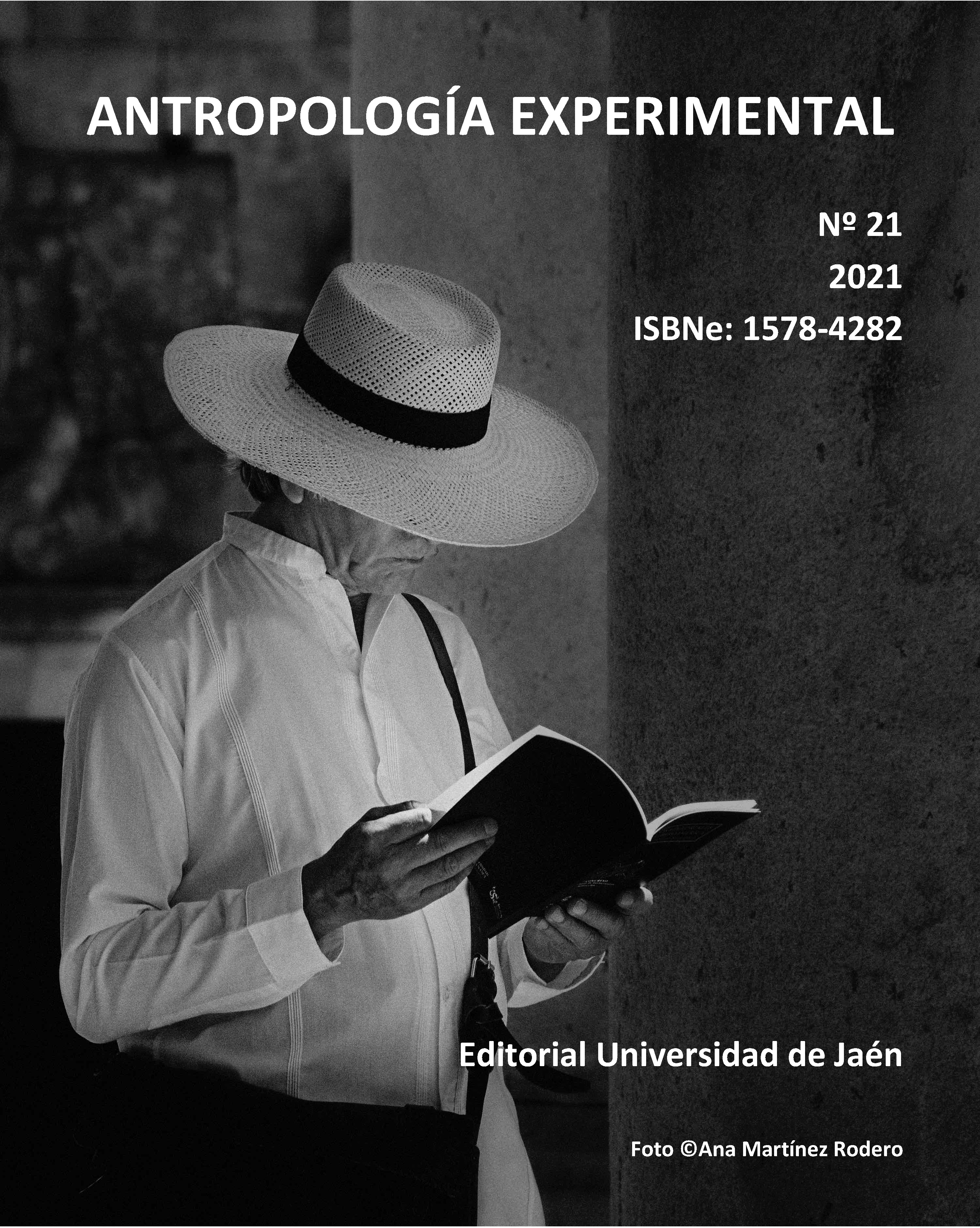“I’m not a body; I’m a thinking head”
. Persistence of mind/body dichotomy in older women
DOI:
https://doi.org/10.17561/rae.v21.5782Keywords:
Aging, Body, Mind, Dichotomies, FeminismAbstract
This paper, inserted in broader ethnographic research on the experience of the aging process in some women living in Madrid, examines the impact that the internalization of classic dichotomies such as those that oppose mind and body has on these women, ranking the two terms of the polarity. This study proposes that the consciousness of the aging body could reinforce dichotomous thinking in them, privileging identification with the mind and detachment from a body that, according to a dualistic symbolic order, appears as immanent, inferior to the mind, and in need of control.
Downloads
References
ANDERSON, Ellen; WILLET, Cynthia; MEYERS, Diana (2020). "Feminist Perspectives on the Self ", en Edward N. Zalta (Edit.) The Standford Encyclopedia of Philosophy, edición primavera 2020. https://plato.stanford.edu/archives/spr2020/entries/feminism-self/> (19-07-2020)
ARBER, Sara; GINN, Jinn (1996). “Mera conexión”, en Arber, S.; Ginn, J. (Comps.). Relación entre Género y Envejecimiento: enfoque sociológico: 17-34. Madrid: Narcea Ediciones.
BOCK, Gisela (199). “Challenging Dichotomies. Perspectives on Women´s History”, en Offen, K.; Pierson, R. R.; Rendall, J. (Edits.). Writing Women´s History: 1-23. Londres: Palgrave Macmillan. https://doi.org/10.1007/978-1-349-21512-6_1
BORDO, Susan (1986). “The Cartesian Masculinization of Thought”, en Signs, 11. http://www.jstor.org/stable/3174004 (19-07-2020).
BORDO, Susan (1995). Unbereable Weight. Berkerley, Los Ángeles, Londres: University of California Press. BORDO, Susan (2001). “El Feminismo, la Cultura Occidental y el Cuerpo”, en Revista de Estudios de Género, 14.
CRUCES, Francisco (2003). “Etnografías sin Final Feliz. Sobre las Posibilidades del Trabajo de Campo Urbano en Contextos Globalizados”, en Revista de Dialectología y Tradiciones Populares, 58, 2. https://doi.org/10.3989/rdtp.2003.v58.i2.154
ESTEBAN, M. Luz (2013). Antropología del Cuerpo. Género, Itinerarios Corporales, Identidad y Cambio. Barcelona: Bellaterra.
GREGORIO, Carmen (2006). “Contribuciones Feministas a Problemas Epistemológicos de la Disciplina Antropológica”, en Revista de Antropología Iberoamericana, 1, 1. https://doi.org/10.11156/aibr.010104
GROSZ, Elizabeth (1994). Volatile Bodies. Bloomington: Indiana University Press.
GUBER, Rosana (2001). La Etnografía: Método, Campo y Reflexividad. Bogotá: Grupo Editorial Norma. HOLSTEIN, Martha;
GULOBOV, Nattie (2010). “Sobre cómo Envejecemos las Mujeres”, en Debate Feminista, 42. https://doi.org/10.22201/cieg.2594066xe.2010.42.820
LE BRETON, David (2012). “Por una Antropología de las Emociones”, en Revista Latinoamericana de Estudios sobre Cuerpos, Emociones y Soledad, 10. http://www.relaces.com.ar/index.php/relaces/article/viewFile/208/145 (27-07-2020).
LOCK, Margaret (1993). “Cultivating the Body: Anthropology and Epistemologies of Bodily Practice and Knowledge”, en Annual Review of Anthropology, 22, https://www.jstor.org/stable/2155843?seq=1#metadata_info_tab_contents (03-08-2020). ttps://doi.org/10.1146/annurev.an.22.100193.001025
MARTÍNEZ BARREIRO, Ana (2004). “La Construcción Social del Cuerpo en las Sociedades Contemporáneas”, en Papers, 73. https://ddd.uab.cat/pub/papers/02102862n73/02102862n73p127.pdf (27-07-2020). https://doi.org/10.5565/rev/papers/v73n0.1111
MASCIA-LEES, Frances E. (2016). “The Body and Embodiment in the History of Feminist Anthropology: An Idiosyncratic Excursion through Binaries”, en Lewin, E.; Silverstein, L. (Edits.). Mapping Feminist Anthropology in the Twenty-First Century: 146-167. New Brunswick, Nueva Jersey y Londres: Rutgers University Press.
MÉNDEZ, Lourdes (2008). Antropología Feminista. Madrid: Síntesis.
MEYERS, Diana T. (1994). Subjection and Subjectivity. Nueva York, Londres: Routledge. MOORE, Henrietta (2009). Antropología y Feminismo. Madrid: Cátedra.
MURILLO, Soledad (2002). “La Mirada Vampira sobre el Cuerpo de las Mujeres”, en Mujeres y Salud, 8 https://matriz.net/mys-08/articulos/art_08_01.html (07-09-2020)
POSADA, Luisa (2015). “Las Mujeres sin Cuerpo: Reflexiones Feministas, en Investigaciones Feministas, 6. http://dx.doi.org/10.5209/rev_INFE.2015.v6.51382 (09-07-2020). https://doi.org/10.5209/rev_INFE.2015.v6.51382
RICHARD, Analiese; RUDNYZKYJ, Daromir (2009). “Economics of Affect”, en Journal of the Royal Anthropological Institute (N.S.), 15, 1. https://doi.org/10.1111/j.1467-9655.2008.01530.x
SAKSON-OBADA Olga; WYCISK, Jowita (2015). “The Body Self and the Frequency, Intensity and Acceptance of Menopausal Symptoms” , en Prz Menopauzalny, 14, 2. https://doi.org/10.5114/pm.2015.52150
SPIVAK, Gayatri Chakravorty (1998). “¿Puede Hablar el Sujeto Subalterno?”, en Orbis Tertius, 3, 6. http://www.memoria.fahce.unlp.edu.ar/art_revistas/pr.2732/pr.2732.pdf (25-07-2020).
VALCÁRCEL, Amelia (1994). Sexo y Filosofía. Sobre "Mujer " y "Poder". Barcelona: Anthropos. VALCÁRCEL, Amelia (2012). La Política de las Mujeres. Madrid: Cátedra.
Downloads
Published
Issue
Section
License
Copyright (c) 2021 GISELA Durán

This work is licensed under a Creative Commons Attribution 4.0 International License.
Responsabilidad de los autores: son responsables por las ideas y datos empíricos de los manuscritos, por la fidelidad de la información, por la corrección de las citas, por los derechos para publicar cualquier material incluido en el texto y por la presentación del manuscrito en el formato requerido por la Revista de Antropología Experimental. Un manuscrito enviado a la Revista de Antropología Experimental no debe estar publicado ni haber sido presentado en la misma forma a otro medio de publicación. Así, mismo, los autores reconocen que conocen y están de acuerdos con estas PAUTAS EDITORIALES Y FORMALES. La dirección de la Revista de Antropología Experimental está permanentemente abierta para aclarar cualquiera de los contenidos aquí citados u de cualquier otra índole que surjan en el proceso de publicación de los manuscritos.






